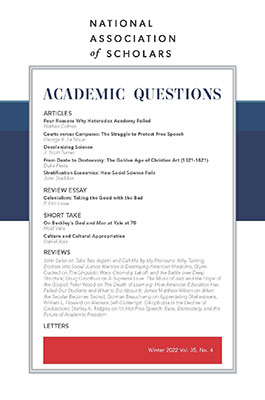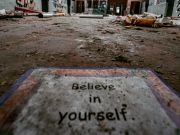A Supreme Love: The Music of Jazz and the Hope of the Gospel, William Edgar, InterVarsity Press, 2022, pp. 224, $24 paperback.
Douglas Groothuis is Professor of Philosophy, Denver Seminary; [email protected]. He is the author of Walking through Twilight: A Wife's Illness—A Philosopher's Lament; Philosophy in Seven Sentences; Christian Apologetics: A Comprehensive Case for Biblical Faith, 2nd ed.; and Truth Decay: Defending Christianity Against the Challenges of Postmodernism. Groothuis wrote “The Enlightenment from Primary Sources,” a review of Richie Robertson, The Enlightenment: The Pursuit of Happiness: 1680-1790, for our fall 2022 issue.
Jazz still has a bad reputation for some Christians and conservatives. In Ideas Have Consequences, the rhetorician Richard Weaver fumes: "Jazz was born in the dives of New Orleans, where the word appears first to have signified an elementary animal function. It was initially a music of primitivism; and we have the word of one of its defenders that jazz has no need of intelligence; it needs only feeling. Jazz, by formally repudiating restraint by intellect, and by expressing contempt and hostility toward our traditional society and mores, has destroyed this equilibrium." Weaver’s rejection of jazz as anti-intellectual, anti-social, and primitive is based more on misunderstanding of the art form (which requires great musical skill) than on reasoned judgment. The origins of jazz are disputed, but its association with places of ill repute does not mark it as reprobate in essence or in perpetuity.
Hostility to jazz should be silenced by William Edgar’s careful exploration of the origins, development, and spirit of this uniquely American art form. As to its direct origins, Edgar counters the brothel-born narrative. “The traditional view is that jazz was born in the red-light district (Storyville) and much of it in brothels. Yet more recent research calls this account into question. Generally, the musicians did not want to play in bordellos or seedy places. There were numerous places where jazz first appeared, including beachfront parties, Saturday night fish fries, funerals, service organizations, and the church.” (108) Weaver to the contrary, jazz, on balance, has shaped the American ethos for the better and has been a vehicle for the advancement of blacks in America. Professor Edgar is a theologian and jazz pianist who leads a jazz band. He has spent his life loving and playing jazz, and reflecting on it as a theologian and apologist. The result is a rich banquet of jazz history, musical analysis, cultural commentary, personal reflection, and biblical insights. This is one of the few academic and explicitly Christian books on jazz, along with Hans Rookmaaker’s Jazz, Blues, and Spirituals, published in 1960 in Holland but recently republished in America. Edgar admits that his passion for jazz is second only to his passion for God. This book brings both together profitably. “I write as an academic, but one whose passion for jazz is nearly unbounded, perhaps second only to my passion for my faith in Christ. I hope the reader can feel this.” (10) Judged by this standard, the book is a success.
The relationship between jazz and “the hope of the gospel” is not simple, but neither is it tendentious. Edgar denies that jazz is “Christian music,” but that its deepest themes and its history resonate with biblical truths. He repeatedly writes that “jazz articulates a narrative which moves from deep misery to inextinguishable joy.” (9) It can be both lament and a quest for transcendence. Although Edgar did not mention this, jazz can also be a manifestation of common grace, whether or not any distinctively Christian themes are explicit.
A Supreme Love is made up of three parts. The first, “Historical Context,” concerns the history of blacks in America, with emphasis on the slave experience. He traces the origin of jazz in African American life and studies its history in these terms. While there is no doubting the colossal contributions made by African Americans to jazz by geniuses such as Jelly Roll Morton, Louis Armstrong, Charlie Parker, Duke Ellington, John Coltrane, and countless others, the origin and spirit of the music may be more ethnically distributed. To make that case, trumpeter and historian Richard M. Sudhalter wrote Lost Chords: White Musicians and Their Contribution to Jazz: 1915-1945 (1999). Edgar does not mention this detailed and scholarly treatment, but I imagine he did not want to enter that fray of controversy.
The black experience is indelibly imprinted on jazz through the influence of the faith, hope, lament, and defiance of spirituals, as well as the earthy laments of the blues. Edgar notes in Part Two, “The Background Genres,” that jazz emerged from the black experience in slave songs, the spirituals, gospel, and the blues. Edgar handles each predecessor to jazz deftly, explaining the genre carefully and showing its ancestral connection to jazz. He denies that blacks are more musically gifted than whites and rightly affirms that jazz expresses the deeply human experiences of suffering and the longing for redemption, as well as deep joy.
“Jazz Music” is the last section and contains five chapters. Two chapters trace the history of jazz from its beginning through its various developments such as ragtime, big band, bebop, cool, jazz fusion, and free jazz. Edgar quotes jazz historian and critic Ted Gioia: “One searches in vain through all the countries of the world to find another example of such a rapid and dramatic transformation from folk music to art music.” (105)
As jazz became more focused on artistic sophistication and less on popularity and danceability (as with bebop), it lost much of its appeal to ordinary folks. I often hear people say that they “do not understand jazz” and so are not too interested in it. Nevertheless, danceable and hummable jazz is still being produced and jazz standards with rich melodies and deep feeling are still performed.
“The Gospel in Jazz” tells of jazz musicians whose Christian faith was evident in their lives and music. Dave Brubeck was a faithful Catholic who wrote a considerable amount of sacred music. Duke Ellington’s album Black, Brown and Beige includes the moving piece “Come Sunday,” sung by gospel singer Mahalia Jackson: “Lord, dear Lord of love/God almighty, God above/Please look down and see my people through/I believe the sun and moon will shine up in the sky when the day is gray.” Ellington also performed three “sacred concerts” near the end of his life and considered these his most significant work.
Edgar’s last chapter, “The Glories of Jazz: What’s Not to Love?” sums up “the seven joys of jazz.” I will mention only four. Jazz is “bluesy.” It has a tragic sense of reality, deeply rooted in black experience, but it does not yield to despair. It also offers “strength to climb,” a feeling of resilience, and hope. In his words, “invention” is essential to jazz, found both in its musical forms and in its soloing. There is no jazz without improvisation. Most importantly for Edgar, “the gospel” is the greatest joy of jazz. He writes, “My belief is that jazz cannot be understood apart from its relationship to (and Black people’s larger relationship with) the Christian faith. This is the rhythm that plays in the music of jazz—sometimes quietly, sometimes clearly, but always present. It is its greatest joy.” (180)
I have two minor objections to Edgar’s satisfying book. First, since the book’s title is a play on John Coltrane’s recording, “A Love Supreme,” I expected more on Coltrane, given his notoriety and well-known spiritual pursuits. His name comes up several times, yet only two pages are dedicated to him. Second, in speaking of the struggle of African Americans to find justice, Edgar favorably cites Ibram X. Kendi’s 2019 book, How to Be an Antiracist as a guide. A reference to Shelby Steele, Glenn Loury, or Thomas Sowell would have been more apt, since they are wiser and more well-versed on racial matters.
Edgar’s fine exposition of jazz is implicitly an apologetic for the gift of this grand music. He ends his fine book with an apt altar call:
Do we love jazz music? Here is the test to answer that question: Do I listen to it, frequent it, make efforts to encounter it? Introduce friends to it? This is not meant as a guilt trip for those whose commitment to jazz is less than wholehearted or whole-souled. It is meant as a simple test. Have I at least given it a chance? Growing to love jazz may take a lifetime. Yet it moves—and moves us—from deep misery to inextinguishable joy. There is no greater love. A supreme love!” (180)
Photo by Duane Loux on Unsplash













